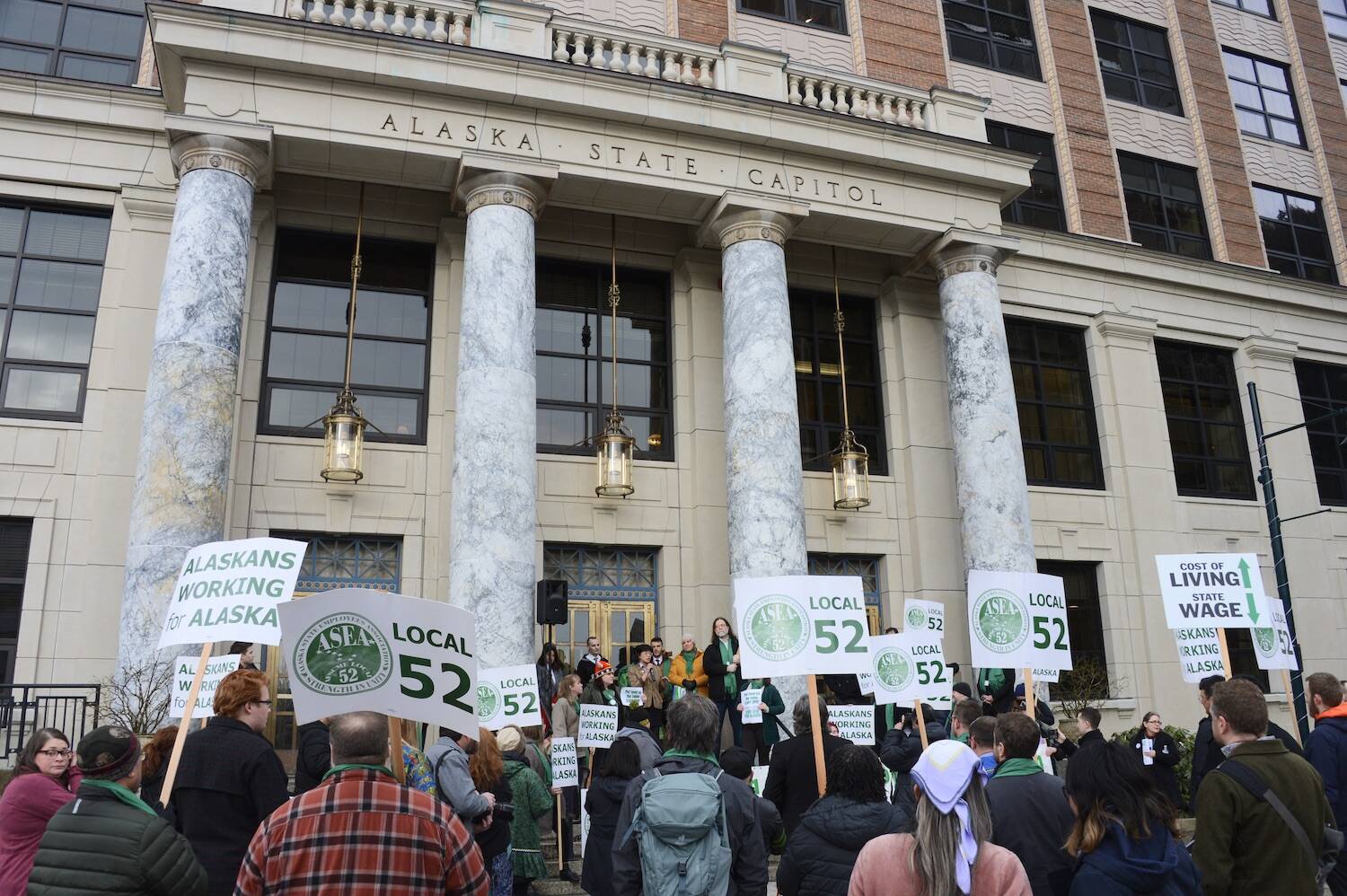The U.S. Supreme Court has rejected an appeal by the state of Alaska in a long-running dispute with the state’s public employees unions, likely ending an attempt by Gov. Mike Dunleavy’s administration to unilaterally rewrite the rules governing public employees’ membership in their unions.
In a brief notice published Tuesday, the court said it will not take up an appeal requested by the state after the Alaska Supreme Court ruled in favor of a legal challenge brought by the unions.
The federal justices, as is typical, did not explain their reasoning in declining to grant a writ of certoriari, a term for a notice to review a ruling. Their decision means the state Supreme Court decision will stand and union members will not need to regularly reaffirm their membership, something that would have made union membership more arduous.
“The U.S. Supreme Court’s denial of certiorari means that the state’s case is finished, and the Alaska Supreme Court decision stands,” said Patty Sullivan, communications director for the Alaska Department of Law.
She noted that subsequent decisions by the Supreme Court in other cases could change matters in the future.
“It’s disappointing the Court didn’t take up the case,” said Attorney General Treg Taylor in a prepared statement. “It was always a long shot, but we had some hope when the Court re-listed our case a few times because that generally means the justices are taking a hard look. Ultimately, the Court declined to take this one on. Where there is uncertainty about an employee’s constitutional rights, the State should always defer to protecting those rights and seek clarity on the State’s role through the third branch of government — which is what occurred here. As always, we are committed to upholding the law and will follow the court decisions.”
According to estimates published last year, the state of Alaska has spent more than $1 million on legal fees defending a 2019 Dunleavy administration proposal.
That proposal would have required union members to regularly reaffirm their union membership through a state-run online portal, an act that then-Attorney General Kevin Clarkson said was required under his interpretation of a 2018 U.S. Supreme Court decision.
Public employee unions challenged the plan in court and a lower court ruled in their favor, issuing an injunction barring the state from starting it while legal proceedings continued.
The state appealed to the Alaska Supreme Court, which ruled in May 2023 that the executive branch violated the Alaska Public Employment Relations Act and the Administrative Procedures Act, as well as the state’s rules for fair dealing.
Rep. Andy Josephson, D-Anchorage, is among the state legislators who opposed the administration’s plan and sought to defund the outside attorneys hired by the state to represent it in court.
Josephson said he was “pleased — not terribly surprised — but pleased” by the U.S. Supreme Court’s decision.
He said the state could theoretically continue its fight by filing a case in Alaska’s federal courthouse, then pursue the issue through the 9th Circuit Court of Appeals and on to the U.S. Supreme Court again, but he doesn’t think that’s likely.
The 9th Circuit has already considered a similar case out of Washington state and ruled in favor of Washington state public employee unions. The U.S. Supreme Court declined to hear an appeal of that decision.
Meanwhile, at Josephson’s urging, the Alaska Legislature is preparing a lawsuit that claims the Dunleavy administration acted illegally when it funded outside attorneys despite legislative instructions. That case won’t have an immediate effect on the union-dues issue but could result in restrictions on future governors.
Heidi Drygas, director of the Alaska State Employees Association — the state’s largest public-employee union — had mixed feelings about the decision by the U.S. Supreme Court.
“This is good news for ASEA, yet we can’t help reflecting on the price Alaskans paid to reach this conclusion,” she said.
“The governor pursued a politically motivated, frivolous lawsuit to waste untold hours and more than a million dollars during one of the largest public service crises in our state’s history. Alaska’s public workforce showed up on the frontlines of the pandemic to help Alaskans despite being largely short-staffed and underfunded. The Governor returned the favor by seeking to undermine their rights to bargain collectively for better wages, benefits, and working conditions,” she said.
Drygas said she hopes the administration will now focus on ways to attract and retain state employees.
• James Brooks is a longtime Alaska reporter, having previously worked at the Anchorage Daily News, Juneau Empire, Kodiak Mirror and Fairbanks Daily News-Miner. This article originally appeared online at alaskabeacon.com. Alaska Beacon, an affiliate of States Newsroom, is an independent, nonpartisan news organization focused on connecting Alaskans to their state government.

